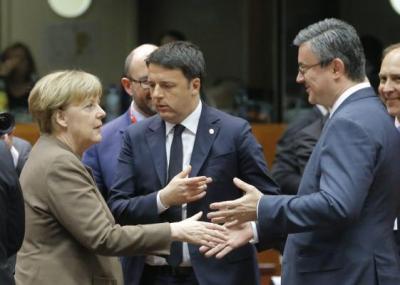Italy gives Austria frosty reception at EU meeting

ROME -- After the measures they put in place to reduce the flow of migrants, impacting hugely on Italy, the Austrians remained isolated at the European Union summit of the 28 member countries dedicated to the refugee crisis and negotiating the terms of Brexit, coming under fire from Italian Prime Minister Matteo Renzi. There was strong tension over Austria's decisions to limit asylum seekers entering the country and place extra controls on its Italian border, which had not been agreed at an EU level, therefore accused of violating European and international laws – the most significant of which is the Geneva treaty.
Renzi has warned that, “We cannot think of closing the Brenner, which is one of Europe’s symbolic passages.” He also made a point of stressing the need for a bilateral solidarity, citing the structural funding plans for 2014-2020. Talking to the Austrian leadership he said, “Either you are jointly responsible in giving and taking, or you cease to be in solidarity with us Contributing Countries. And then we shall see what happens.”
Austria’s new daily cap on asylum seekers came into play on Friday, allowing a maximum of 80 migrants per day to claim asylum, in a move that the European Commission has described as “plainly incompatible” with EU laws. In addition, they are limiting the daily number of people transiting Austria to seek asylum in neighbouring countries to 3,200.
European migration commissioner Dimitris Avramopoulos complained in a letter to Austrian Interior Minister Johanna Mikl-Leitner that “Such a policy would be plainly incompatible with Austria’s obligations under European and international law.” European Commission President Jean-Claude Juncker also criticised the move, stating in a news conference that, “As far as Austria is concerned I have to say I don’t like this decision, we are questioning whether it is within European law, and we will have a friendly discussion.”
On his arrival in Brussels Renzi appeared more understanding of Austria’s reasons, saying that “they’re in a difficult position, these days they have more asylum seekers than Italy in absolute terms. We need to work together though because there are no emergency procedures in the Balkans. We need a strategy of increased investment in their countries of origin and of international cooperation. It’s clear that the Dublin Treaty has failed - everyone can see it. It won’t be easy, Italy will play its part, but the question is whether Europe will also play their part.”
From Athens, where he is meeting the Greek president Prokopis Paulopoulos, the Italian Foreign Minister Paolo Gentiloni warns about the “risks of unilateral choice which could cause a crisis bringing with it the annulment of one of Europe’s greatest achievements: the Schengen agreement and free movement.”
Strong concern over Austria’s new measures was also stressed by leaders from Croatia, Slovenia, Serbia and Macedonia.
ch-ft


